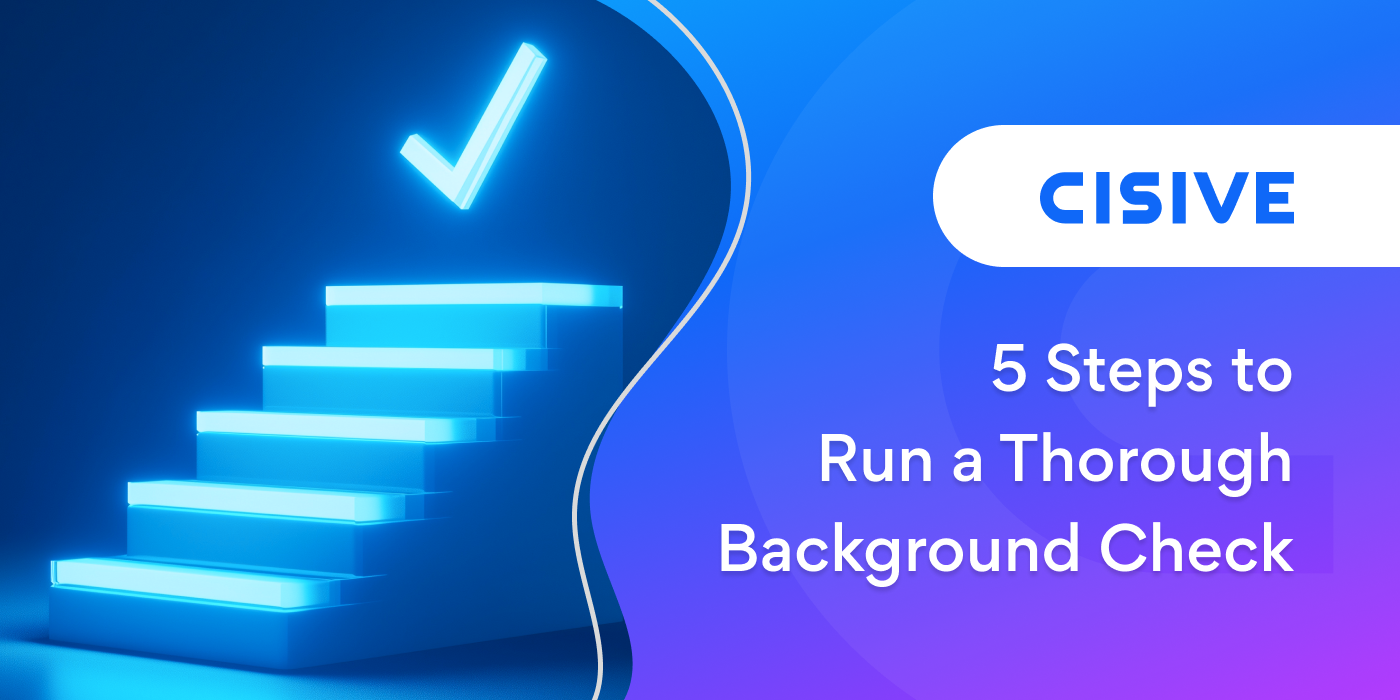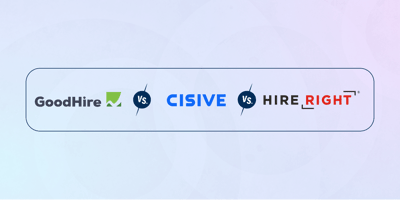

Healthcare employers have unique needs when it comes to vetting potential employees. Whether you're...

Hiring the right candidate goes beyond seeing a great resume and having a strong interview. A bad hire can lead to lost productivity, workplace issues, brand damage, and even security risks.
Rushing through — or skipping — a background check can leave your company vulnerable to costly mistakes. But how do you conduct one that’s both thorough and compliant without getting lost in paperwork?
Many businesses rely on generic screenings that miss key details, while others overcomplicate the process, creating delays. A well-structured, compliant, good background check provides clear and relevant insights without unnecessary roadblocks. Let’s discuss how to hire with confidence and avoid costly surprises.
Key TakeawaysHere are the key things you need to know about a thorough and effective background check:
|
At its most basic function, a good background check helps you make informed hiring decisions. It should confirm key details of a candidate’s background, flag potential risks, and comply with legal guidelines — all while respecting the candidate’s rights and privacy.
A solid background check is both thorough and efficient. It should provide useful insights without creating unnecessary roadblocks. A rushed or incomplete check can lead to costly mistakes, like hiring someone dangerous to your company, staff, or clients.
A background check should do more than confirm basic facts — it should give you a well-rounded view of a candidate’s professional and personal reliability.
Here’s what a standard job applicant background checklist looks like:
Strong background checks dig deeper where it matters. Financial history, driving records, or exclusion screening lets you confirm a history of responsibility in roles requiring high levels of trust.
A great background check is only as good as its sources. Relying on unreliable or incomplete 3rd party database information can lead to poor hiring decisions, compliance issues, and unnecessary risks. Build a clearer picture of your candidate’s qualifications and history by knowing where to look and which sources provide the most accurate insights. Utilizing the primary source is the most reliable and accurate approach when collecting information.
Examples of primary, reliable background check sources include:
Quality matters more than quantity when gathering background information. Stick to trusted, verifiable sources rather than outdated databases or third-party reports that lack accuracy.
Good background checks help protect your workplace at every level. Any person in any role can expose your company to liability, security concerns, or costly turnover if you make the wrong hire. A well-planned screening process reinforces consistency, fairness, and compliance while maintaining workplace integrity.
That said, not every role requires the same level of screening. Tailoring background checks based on job responsibilities keeps the process efficient and relevant. The key is balancing thoroughness with practicality so you gather the right insights without unnecessary delays or privacy concerns.
Different roles come with different risks. A one-size-fits-all approach can leave gaps or create unnecessary delays, so be sure to have procedures for which roles require which kinds of checks.
Let’s dig deeper into three of the most common examples of background checks, which you’ll likely perform for roles at every level.
A criminal background check uncovers past legal offenses so that you can assess workplace safety and liability risks. Certain convictions may be relevant to the job; for example, fraud or theft could be relevant to anyone handling money.
Evaluating results in context, rather than automatically disqualifying candidates, is key. A past offense doesn’t always define a person’s future. How long ago was the offense, and have there been any issues since? How severe was it? Understanding applicant history allows you to make informed decisions balanced with fair hiring practices.
A drug screening detects substance use that could impact job performance or workplace safety. Substance use or abuse can also cause productivity loss and distraction for both the employee and fellow staff.
Depending on the role, certain industries have strict requirements, while others leave it to your discretion. For example, someone driving or running other machinery should be free of all substances, while an office position may have more leeway. Not checking for substance use opens you up to liability risks if that employee harms someone.
Verifying a candidate's education or professional licenses confirms that the credentials they’ve listed are accurate and align with the position requirements. This protects your company from potential liability and reassures you that you’re hiring individuals capable of fulfilling their roles.

Every new hire brings both potential and risk. A good background check helps you verify a candidate’s history and reduce the chance of costly mistakes. Rushing or overcomplicating the process can lead to missed details or unnecessary delays.
When done correctly, a background check strengthens your hiring decisions and builds a more secure, trustworthy workplace. Here’s how you do it:
Before you run a background check, you must get a candidate’s written consent. Being upfront about the process builds trust, avoids confusion, and, most importantly, keeps you in compliance with privacy regulations and fair hiring practices.
A well-executed background check does more than protect your business — it reinforces integrity at every level. Candidates who feel informed and see clear, transparent processes are more likely to engage positively, strengthening your hiring process and workplace culture.
Employment laws and industry standards shape how you conduct background checks, and failing to follow them can lead to legal trouble or hiring delays. Staying informed of laws and standards protects both your business and candidates.
You could be accused of discrimination if you only check some candidates and not others for criminal checks for the same role. You could also be sued if you fail to keep sensitive information private. If you skip background checks altogether, you’re then liable for negligent hiring if that candidate harms fellow staff or clients.
Certain roles require specific screenings (for example, a finance company may require a credit check depending on the role), while privacy laws dictate what you can check and how you use the results.
A good background check starts with gathering the right details. Full name, previous names, date of birth, Social Security number, and past employment history all help ensure accurate results. Missing or incorrect information can slow the process or return incomplete reports, creating unnecessary delays.
Collecting the right data upfront keeps your screening process smooth, reduces errors, and helps you make informed decisions with confidence.
Choosing the right background check provider goes beyond receiving reports and is more about trusting the results. A thorough, reputable service helps you avoid risks that come with incomplete or inaccurate screenings. The wrong provider can slow hiring, miss key details, or even put your business at legal risk.
Cisive stands out for its deep, compliance-focused approach. When your hiring strategy matters, cutting corners isn’t an option. That’s where Cisive really performs.
A background check only helps if you take the time to review the results carefully. Skimming through a report or making snap decisions based on a single red flag can lead to costly hiring mistakes. It can even lead to legal issues if pre-adverse and adverse action isn’t initiated and resolved properly.
You need to read the background check to assess the findings in context: Does a minor offense from years ago truly impact the role, or is there a pattern of concerning behavior? For a finance role, does the credit report reveal true financial responsibility issues or just a brief hard time from decades ago?
Thoughtful evaluation helps you hire based on facts, not assumptions. You reduce the risk while keeping decisions fair and well-informed.

Not all background check providers offer the same level of accuracy, compliance, or service. You need a provider that delivers reliable results, follows industry regulations, and supports your hiring process without unnecessary delays or complications.
Here are some tips on choosing the right background check provider.
A background check provider’s reputation reflects its capability to deliver accurate, timely, and compliant results. A provider that values precision and service helps you move forward confidently, while one that cuts corners forces you to question every report.
A provider with a history of errors or delays creates unnecessary risks and potential compliance issues. Use reliable review platforms like G2 to find a provider that other businesses trust.
Look for a provider that offers a full range of solutions, including compliance, identity services, drug/health screenings, and ongoing monitoring that alerts you to red flags in near-real time. Also, look for a provider that can run a basic background check (criminal history, identity verification, etc.) plus any checks for your specific industry.
For the trucking industry, find a provider with thorough driving record checks. For healthcare, you’ll want them to check healthcare exclusion screening lists and license verification.
A provider with comprehensive services means you get everything in one place without juggling multiple vendors or dealing with incomplete reports. It also provides a better experience for your candidates.
Choose a provider that understands which screenings matter most. Every industry has unique risks, laws, regulations, and hiring standards, so a one-size-fits-all approach leaves gaps.
A hotel can’t afford to miss a thorough criminal background check, just as a financial firm must verify credit history. When your provider aligns with your industry’s requirements, you get accurate, relevant insights that help you secure the best talent.
A background check provider should deliver thorough results without disrupting your hiring timeline. Delays can leave positions unfilled, slow down onboarding, and frustrate you and your candidates.
Some screenings take longer than others. When hiring seasonal employees, you can’t afford long wait times. Deeper checks may take longer for a leadership role, but they should still be managed efficiently. A provider that balances speed with accuracy keeps your hiring process on track without cutting corners.
Cisive eliminates the guesswork from background checks by combining advanced technology with human expertise. Never relying on outdated databases or incomplete records, our system pulls directly from verified sources to reduce errors and delays, resulting in 99.9994% accuracy.
Compliance is built into every step, so you don’t have to worry about missing key legal requirements. You’ll no longer have manual processes or unclear results to work through. With direct data access, Cisive pulls real-time information from verified sources.
Use Cisive for thorough, fast background check reports and the peace of mind of legal compliance. With nearly 50 years of expertise in background screening, our work ensures reliable results without the frustration of inconsistencies or incomplete information.
Choosing the right background check provider means finding one that delivers accuracy, compliance, and efficiency with elite support. Cisive offers a consultative approach to design comprehensive solutions beyond basic screenings, giving you reliable results tailored for both the role and your industry. As a client, you will find our level of support is one of our key differentiators, which has earned Cisive a 97% client retention rate.
Speak with a Cisive expert today to schedule a demo and learn how Cisive streamlines background checks with precision and compliance in mind.
Author: Cisive Staff
Bio: Contributed by a member of our staff with expertise in background screening for highly regulated industries.
Let's Connect on LinkedIn
Healthcare employers have unique needs when it comes to vetting potential employees. Whether you're...

It's important to understand and comply with your state's healthcare background check requirements....

Hiring the wrong candidate can lead to a cascade of problems. Imagine unknowingly bringing on an...